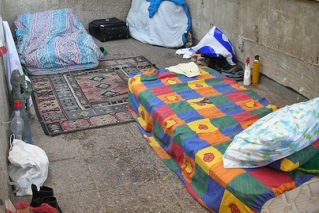 CC-BY-NC-SA Yoav Lerman
CC-BY-NC-SA Yoav LermanOn Monday, October 6, 2014, an extended bench of judges at the National Labor Court will debate whether it is permissible to deny welfare support to eligible recipients who receive financial assistance from their families, friends or external welfare organizations. The Association for Civil Rights in Israel has joined the proceedings as a friend of the court to assert that the denial of benefits would violate the right to a dignified existence.
This case before the court is an appeal to a judgment of the Tel Aviv District Labor Court that dealt with a single mother who was deprived of her entitlement to income support after the National Insurance Institute of Israel (NII) discovered that her elderly parents were supporting her by transferring small sums of money to her account. The NII justified its decision by claiming that the welfare benefit is intended only for those who have no other resources to support a dignified existence. The district court overturned the NII’s decision after finding that there was no way to determine whether a supplemental income benefit was sufficient to enable a dignified existence. Consequently, it was found that entitlement can not be automatically denied to any person who receives additional external financial support. The District Court ruled that the burden of proof lies with the NII to show that the level of assistance received by an individual person is sufficient to void entitlement to the welfare benefit.
ACRI strongly believes that the denial of assistance in these circumstances would constitute a serious blow to the the right to live with dignity, and that such a dramatic decision can not be made in the absence of express statutory provisions. The NII took the liberty in this case of establishing internal guidelines on this matter, even though the National Insurance Law does not prohibit the receipt of assistance from relatives. According to ACRI’s submission, the court must rule that this provision is illegal and that there is no room to interpret the law in such a way that it violates the basic right to live a dignified existence.
In ACRI’s request to join the proceedings, submitted by Attorney Maskit Bendel, it was noted that the state itself has recognized that income support benefits are insufficient, and that multiple measures indicate that the standard of living for recipients of this benefit are extremely poor with regards to housing, health and food security. As such, it is unsurprising that those who are eligible for this benefit are forced to seek additional assistance from relatives and friends.
Approximately two years ago, the High Court of Justice set a precedent that the NII could not deny unemployment benefits to an eligible recipient solely due to the ownership of a vehicle. In the judgment, written by outgoing Court President Dorit Beinisch, it was made clear that the denial of eligibility based solely on ownership of vehicle, without an examination of the individual circumstances of the case, violated the right to live in dignity. It is upon this precedent that ACRI based its submission in this case – that the NII is making decisions based on sweeping claims that can not accurately attest to the economic conditions of potential benefit recipients.
According to ACRI Attorney Maskit Bendel: “These benefits that are designed to assist those in need are far too low, and are continuously subjected to arbitrary cuts so long as the state refuses to set standards on what constitutes a dignified level of existence. In most cases, financial support from families are intended to help recipients keep their head above water. The denial of benefits in these circumstances would place entire families in huge distress.”
Aditional Materials







